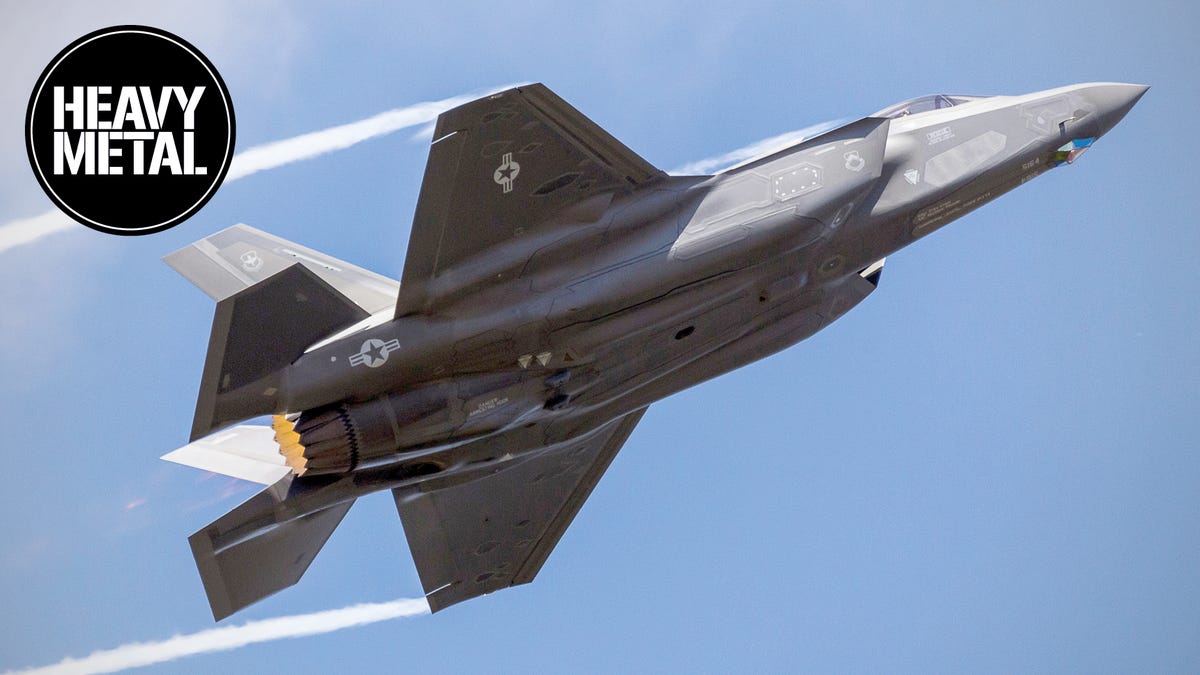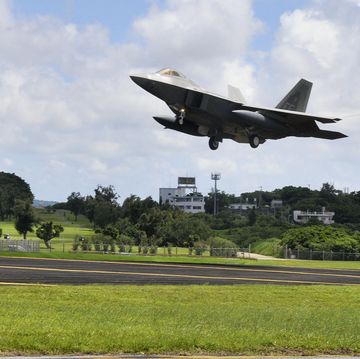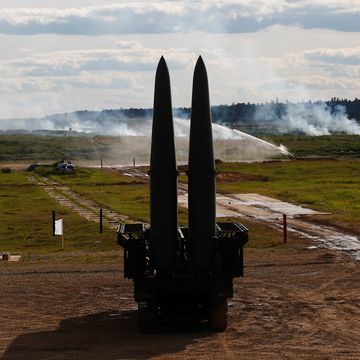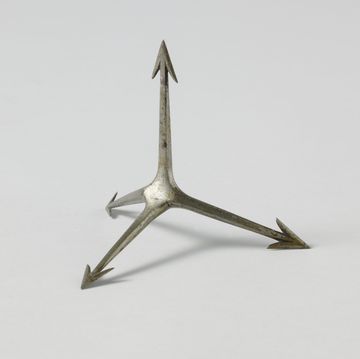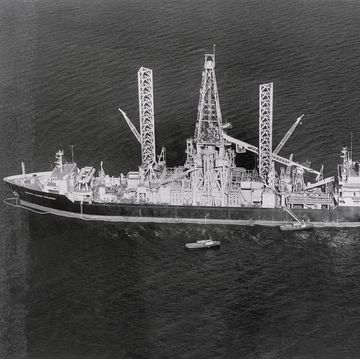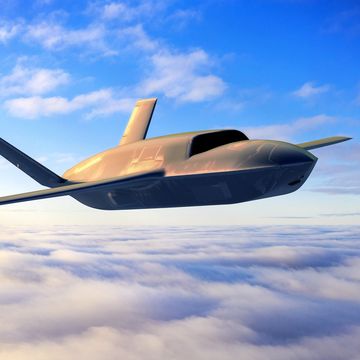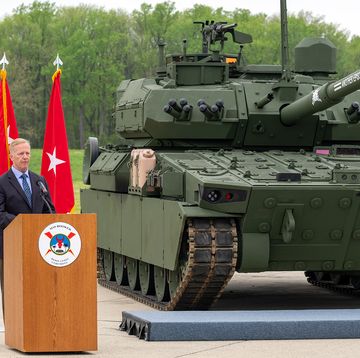Maj. Gen. Michael Carey didn't know his career was on the verge of total collapse when he arrived at Popular Mechanics' New York City office in late July 2013.
At the time, Carey was Commander of the 20th Air Force, which controls America's land-based nuclear missiles. He was in town to meet with members of NASDAQ, where we would ring the opening bell in September, and a visit to PopMech happened to fit his schedule. Carey toured the office, checked out our view of Central Park, and sat for an interview about intercontinental ballistic missile (ICBM) tests for a feature coming up in our March 2014 magazine. Carey came off as knowledgeable, experienced, and in command of the issues plaguing America's aging ICBM force. He was also witty and engaging, discussing his take on Red Alert, the novel that was the basis for Dr. Strangelove. (The movie was superior to the book, though both run afoul of actual nuclear security practices.) He certainly came off as sober and intelligent.
But just months later, Carey was disgraced. In October the Air Force fired him. Officials offered no details, saying only that the dismissal involved personal conduct. "The nuclear deterrence mission is one of great focus, discipline," Air Force spokesman Brig. Gen. Les Kodlick told the press. "Personal behavior is vital to that, especially from a commander."
Then, just before Christmas—a good time to bury this kind of unfortunate news—the Air Force released a detailed but redacted report detailing why Carey was fired. The report says he engaged in "inappropriate behavior" while on official business in Russia last summer, including heavy drinking and associating with "suspect women." And the details get much more sordid.
The report chronicles the binge day by day, and can be read in its entirety here. Members of a delegation reported that Carey was drunk virtually the entire trip, insulted the Russians with his comments and tardiness, tried to convince bar staff to allow him on stage to play guitar, and went out drinking with women he met in Moscow. No one testified that Carey was ever alone with the women. But the inference that he was drunk and talking about his work was enough to cast a deeper pall over the behavior. It's no secret that in Russia, attractive women and men have long been the route to spy on or blackmail American officials.
The women knew Gen. Carey was a big shot in the national security world because he told them so, according to members of the delegation. That sort of indiscretion sends up red flags in the Air Force's Office of Special Investigations (OSI). Carey himself submitted to the OSI the card of one woman he met who was working in his hotel's cigar shop, commenting on her suspicious nature: "A tobacco store lady talking about physics in the wee hours of the morning doesn't make a whole lot of sense."
Underappreciated
According to the report, a booze-addled Carey was speaking loudly in a hotel lounge during the first night in Moscow about how he is "saving the world." Carey hit some of these notes in his final interview here at Popular Mechanics. "We keep a lid on World War III," Carey said then. "And for less than $5 billion a year. The U.S. Postal Service lost three times that in 2012."
When the General allegedly proclaims his importance while drinking, it can be a reflection of the insecurities of the larger force. Indeed, ICBM professionals often point out that they are underappreciated. During his PopMech interview, Cary also lamented the lack of attention and appreciation given to the missile launch crews and maintainers. "We use our missiles every day, but we don't launch them," he said. "The people who know this are our possible adversaries. The people who don't happen to be the same people who benefit the most from our existence."
During the Moscow trip, Carey also discussed low morale within his service and his attempts to raise it. "[A] Witness stated Maj. Gen. Carey was talking about the importance of his position and that his group had the worst morale and that the leadership wasn't supporting him."
These statements have elements of truth to them. ICBM professionals had a rough year in 2013. Press reports detailed failed readiness reviews at the air wings, and two reports stated in stark language that the morale in the missile fields is lagging. One of them, an internal Air Force study by RAND Corp. that was obtained by the Associated Press via a Freedom of Information Act request, found the nuclear force personnel it polled suffer from burnout. (Its authors defined that as "feelings of hopelessness, tiredness and a sense of being trapped.")
The basic problem is that nuclear missiles are no longer considered to be the most vital weapon for national security. In fact, the Minuteman III ICBM's replacement has been delayed numerous times, most recently because of the Obama administration's decision to extend the Minuteman III's retirement from 2020 to 2030. The missiles have been upgraded, but the silos and launch facilities have been in the ground since the 1960s. So if Carey feels that nukes are treated like a second-class weapons system, he has facts on his side.
"Perfection Must Be the Standard"
Still, those working with nuclear weapons are held to very high standards. "Perfection must be the standard for our nuclear forces," Defense Secretary Chuck Hagel said in a late 2013 speech, repeating something that the missileers have been told every day since entering this line of work.
And when ICBM airmen fail, the consequences can make headlines. Last year, missile crews were caught keeping massive blast doors open in the launch control centers. It's a breach of security, but hardly the stuff of scandal. Yet the wire service story spread across the world. Missile crews at Minot Air Force Base did not pass inspections. Their poor grades made headlines, but subsequent improvements went virtually unheralded.
During his visit to PopMech, the general took some pointed shots at press reports bemoaning the failures. "When you hear someone failed a test, keep in mind they had to have a 90 to pass and the average is 94," Carey said. "We expect 100 percent. A D grade to me is 92."
While the likelihood of firing missiles is low, the demands of the job are very real. The demand to be perfect leads to more than just bad PR—ICBM airmen seem to be cut less slack than other Air Force officers. Cases handled by administrative punishment in ICBM wings were 29 percent above overall Air Force levels in 2011 and 23 percent above in 2012, according to the RAND report. The number of court martials is similarly high. Carey was one of the people inside the Air Force who wanted to eliminate the disparity.
Carey earned his punishment for his behavior in Moscow. Nuclear weapons—and the deterrence they represent—are as much about diplomacy as they are military readiness. But while the general's career is over, this also might be a case when the drunk at the party said a few things that hit close to home—and it makes sense to listen.
Joe Pappalardo is a contributing writer at Popular Mechanics and author of the new book, Spaceport Earth: The Reinvention of Spaceflight.

